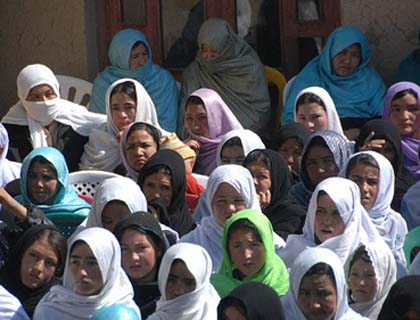Two months ago, the Human Rights Watch suggested Afghan government to enforce the Elimination of Violence Against Women law (EVAW) before the end of his term. The paper released by the organization highlighted health and economic consequences of early marriages and domestic violence for which the law considered severe punishments. The law was previously signed by President Karzai in 2009 but stoke tough resistance in the lower house of the parliament among MPs.
Back then number of university students mostly from Shariah Faculty held protests in support of parliamentarian move, chanting slogan such as death to women rights. On the other hand, the supporters made mockery of the opposition as one of the Afghan journalists who are so active in the media wrote that foreigners are asking us to avoid violence against women but we say: “no, we will commit”.
Likewise, by each passing year, cases of violence against women registered by Ministry of Women Affairs and other organizations working for the cause have increased. Annually thousands of cases are registered by government concerned departments or by NGOs working in this sphere. Meanwhile, women rights activists believe that the actual violent cases might be far larger, as many do not get the chance or avoid reporting due to cultural reasons. So, putting such an assumption beside the registered cases, we end up to an appalling conclusion.
In addition, the peace negotiation with Taliban militants is another fearsome factor. It is highly unlikely that the group lay down arms unless it gets mouth-watering compromises on democratic laws and achievements. Despite efforts made to change the prevalent concept of people, Taliban have not changed an inch and they impose the same radical interpretation of Shariah laws, if they return to power. Even if the group does not become enough powerful to overrule the government but strong enough to continue being considered as power, its leaders will not accept the woman participation in civil services and other social, economic and political spheres to an extent they are involved now.
Thus, there is one thing clear that, not only Taliban militants, but some people within the administration have anti-women tendencies if the circumstance change and they are provided the chance to express their inner tendency. So, the danger would be multiplied against women rights and other democratic achievements on the absence of foreign forces in whose presence many dare not to pressurize government to include their interpretations of women rights. As I noticed in the above such dangers are highly likely to become serious if the foreign countries leave soft power battleground. Needless to say, force and bullets will not change the society and traditional and cultural values fundamentally. They are able to silence the people and impose the targeted sets of norms on any society but such actions will not work indefinitely. Moreover, such imposition may head to spark and strengthen an underground resistance which may always break out.
A similar case may be repeated in the country unless calculated measures held. If the common people continue to believe that a cliché woman is the symbol of dignity and virtue, than any woman does not dare going out and taking part in social, economic and political issues will be deemed as perverted. There is no need of Taliban or other like-minded groups. The society will itself act as Emarat-e-Islami and “stone the woman to death in the desert court”.
Now the main question is what are the sources that fuel and prolong violence against women? Various reasons can be mentioned for the widespread violence and malpractices against women. But generally but there are two main sources that led to production and reproduction of violence against women. One is culture and the other one is interpretation of religious sources. Putting just a glimpse to religious books, we can easily figure out that interpretations provided by religious interpreters are in opposition to modern recognized rights and values for women.
Part of this interpretation is linked to patriarchal system. Under this system religion is also translated from sunglass of a man. Even those signs that denote on the equality of women are whether kept untouched or interpreted in reference to issues that corroborate the second role of women.
Therefore, for embracing women rights and other democratic values, the society should be changed. A new interpretation should be provided by religious scholars based on the very essence of human beings not on differences of women and men.
For such a change, the international community should support those, particularly youngsters, who believe in modern values. Their very believe makes them committed to fight for with not much expectation from people or organizations to support them. Unfortunately, what the involved countries have done was pouring cash to pockets of those who enjoy communal influence and support. Part of these influential leaders actually does not believe in human rights no matter how much money they receive. If today they reach to a conclusion that their pretension of believing democracy and modern values do not bear any benefit, they will just give up and become the role model of fundamentalists.
Therefore, Individuals and organizations should be supported that basically believe in modern values. They can fill the gap that will be created as result of foreign military pullout as many organizations and activists will not feel safe or do not possess money to continue working in the country. They can play effective role in changing the social norms because they are familiar with the society as well as people will not show resistance against them as they would against foreign citizens.

